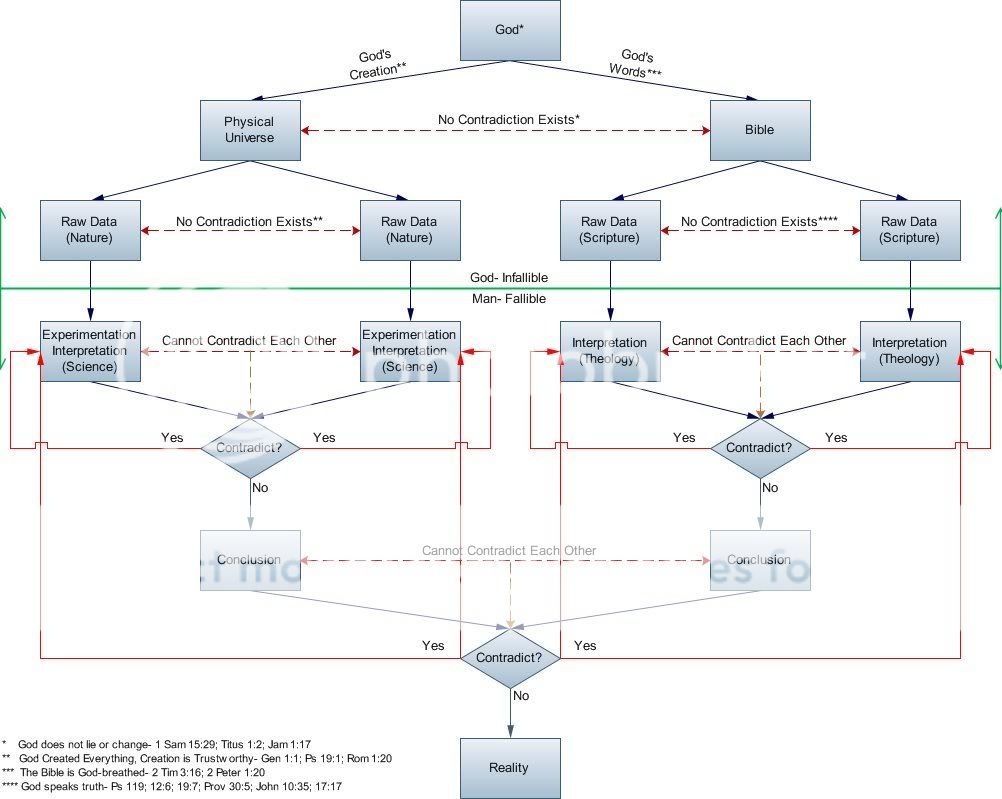People in the Christian community led me to believe that the doctrine of Biblical Inerrency applied to the interpretations, rather than the raw statements of Scripture. Scientists persuaded me believe that their interpretations of the data could not be questioned, rather than the raw data.
Believing these inaccuracies led me to further to believe that my faith was based on emotion, and science was based on reality- the two could not be reconciled. I was in this state of confusion and conflict for quite a few years.
About six years ago, I was shown the distinction between interpretation and raw data. Suddenly, I realized that my faith was consistent with reality. Many in both the Christian and scientific communities misunderstand the fact that all facets of reality are consistent with one another. If their interpretations conflict, then something must be reinterpreted. If a religion is to claim to be true (a part of reality), then the interpretations of its revelatory source(s) must, not only be consistent internally, but must also be consistent with the rest of reality. Allow me to take some time to explain the processes and how this is possible:
"The heavens declare the glory of God; the skies proclaim the work of his hands." Psalms 19:1
"For since the creation of the world God's invisible qualities—his eternal power and divine nature—have been clearly seen, being understood from what has been made, so that men are without excuse." Romans 1:20
These verses are quite a relief. Since God is consistent and does not lie his words (the Bible) will never contradict his creation (nature). What may contradict is man's interpretation of the Bible and man's interpretation of nature, because of man's fallen nature.
The scientific enterprise operates on two assumptions (really more, but I won't go into those now): that the observations of nature can be trusted to accurately reflect nature; and nature is consistent. These two allow scientists to perform experiments and tests on nature to discover it. Based on the second assumption, if two experiments are at odds with each other, they are repeated, reinterpreted, and new theories are formed until the interpretations of the data are consistent- this goes for interdisciplinary study also.
This is the process:

The Christian Church has traditionally held that the Bible is inspired by God and has no errors (the doctrine of Biblical Inerrancy). Biblical scholars use this belief to help them interpret difficult passages. If the interpretation of two (or more) passages contradict, then they must go back to the original, and reinterpret until the two interpretations are in harmony.
This is the process:
 Christians believe that both scripture and nature come from God, and God tells us that we can trust the raw data of both (even post-Fall)
Christians believe that both scripture and nature come from God, and God tells us that we can trust the raw data of both (even post-Fall)Here's the flow:

When all this is put together:
Scripture interprets Scripture
Nature interprets Nature
Scripture interprets Nature
Nature interprets Scripture
When the interpretation of one is unclear, we can refer to others for clarification. Also, if two interpretations contradict, man must go back to the raw data and re-interpret, but make sure that that re-interpretation does not contradict other interpretations. Sometimes, many interpretations must be re-evaluated at the same time. The ultimate goal is complete consistency in our interpretations of Scripture and nature.
This is the process when the three charts are combine:

This process is extremely valuable for both the Christian and the scientist (even more so, if you're a scientist who is a Christian). This process helps us establish what is true about reality, by providing a reasonable way to resolve conflicts in interpretation. When we understand what is true about reality, it sets a firm foundation for what we believe. Over the past six years, I have used this process of data gathering, interpretation, and reinterpretation to build a solidly consistent worldview.
I spend much time investigating nature, and studying God's Word. As an implication, I learn more about God and continue to build a loving and trusting relationship with Him. The stronger my beliefs and my trust are established, the more passionate I become in my behavior. To keep with the theme of "consistency", I will be blogging about the importance of consistency, not only in what we know, but consistency between what we know and how we act (Psychology Class Series (Parts 4-8); Right Living or Right Thinking).
For more, please see my new Science and Faith page and the following articles:
Believing Science and the Bible at the Same Time.by Jeff Zweerink
Is The Bible Sufficient? by Greg Koukl
What is the Relation between Science and Religion? by William Lane Craig

